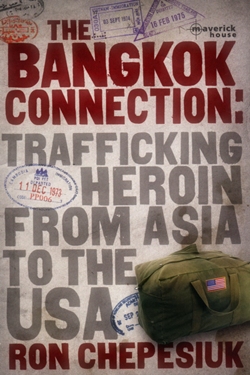The last few weeks have brought books to the reviewer’s table dealing with the American involvement in other parts of the world. This week it is a book called The Bangkok Connection written by Ron Chepesiuk, (ISBN 978-1-905379-74-3, Maverick House, 2011). It covers the life of Ike Atkinson, a drug baron, also known as Sergeant Smack. It also covers, in much depth, the ‘heroin in the cadavers’ issue, on which everyone seems to have had some input or ‘first hand’ knowledge.
Its origins were in the film ‘American Gangster’, a typical celluloid tale, using the small-time gangster Frank Lucas’ claims that heroin was shipped back to the US in the body bags (and body cavities). Chepesiuk convincingly (for me at least) debunks the entire myth that this ever happened. In fact, Ike Atkinson describes it as “a big lie… the biggest hoax ever perpetuated.” And Ike should know. He was, at that time of the Vietnam War, running the largest drug smuggling ring bringing Thai heroin to the USA.

Author Chepesiuk is certainly an investigative journalist. Amongst other interesting facts he dug up, were items such as the famous fighter Joe Louis who spent his entire life paying off his back taxes, and was denied deductions such as the $3,000 he gave away in ticket sales to servicemen.
He details the corruption in the military and in war zones. “Saigon was also awash with corruption. Just around the corner from the US Embassy was the black market known as ‘PX Alley’ where one could find anything from vintage champagne to exotic cameras.” The racketeering was shown in a six-part Associated Press series, showing that both the Americans and the Vietnamese were creaming off 40 percent of the 1.2 billion USD ‘aid’ coming from America.
Chepesiuk explains the rationale behind corruption in Thailand and shows that it is steeped in history, ending up where, “This created a situation where the wealthy controlled the government.” Has anything changed, I wonder? But that corruption additionally existed in the US, and is also brought to the surface.
It was a fascinating book in many ways. Author Chepesiuk has done his homework well. The interviews with Ike Atkinson show the now octogenarian to be a well mannered gentleman, who should best be called an opportunistic hedonist, rather than a hardened criminal. That he would use underhanded means to gain wealth for himself is without a doubt, but it would seem the American military system left itself so open that anyone with half an eye for an opportunity could abuse the system. Atkinson at no time questions the morality of his involvement in heroin trafficking, but when you read of the corruption which allowed the Bangkok beginning of the connection, and the corruption in the American end of the connection (including the DEA itself), it is difficult to see any aspects of morality in either side.
If you are into real-life stories of just how low societies will go in the pursuit of the almighty dollar, you will enjoy this book. At B. 530 on the Bookazine shelves, it is a very good read.




